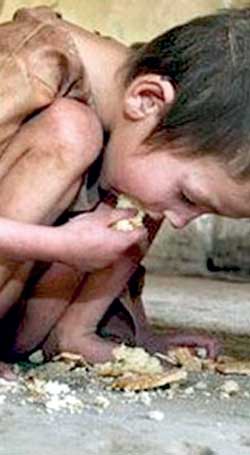
.jpg)
All over the world, tons of good food are thrown away while millions go hungry. But at least a few countries have taken steps to curb the waste, and there are several NGOs and other organizations worldwide fighting food waste and hunger in their own ways.
France has passed a new law which makes it illegal for supermarkets to throw away food. They will also be prohibited from deliberately destroying unsold food so that the needy can’t eat it.
"People ranging from the poor, the homeless, to struggling students commonly forage supermarket dust bins at night, where food items close to the expiry date are dumped. "

In a rare show of unanimity, politicians from the left, right and centre joined forces to pass legislation that will force businesses with a footprint of 4,305 sq ft (400 sq m) or more to sign contracts with charities by July 2016 or pay fines of up to 75,000 Euros for breaking the new law. It’s either that or two years in jail.
People ranging from the poor, the homeless, to struggling students commonly forage supermarket dust bins at night, where food items close to the expiry date are dumped. Till now, this has been illegal under French law and people picking up yoghurt, pizzas and other food items could be charged by police for theft. The new law has changed that. Some supermarkets make the food inedible by putting bleach into dust bins.
“It’s scandalous to see bleach being poured into supermarket dustbins along with edible foods,” said Socialist member of parliament (deputy) Guillaume Garot, the former minister of food who proposed the bill. The law will strive to educate school children about food waste in schools and businesses and also spearhead a drive to halve food waste in France in 2025. It is estimated that the average French citizen throws out 20-30kg of food per year, including at least 7 kg unopened food items. Total food wastage in France is estimated to be 7.1 million tonnes. Customers are responsible for 67%, while restaurants and shops follow with 15% and 11% respectively.
"Huge amounts of food are wasted at weddings, birthdays, anniversaries, religious occasions and other high profile events which can have up to 10,000 guests each"
In France, there are groups of volunteers known as recycling commandos. They, together with direct action foraging movements and other pressure groups have been campaigning against the waste of edible food items since a long time. Members of some action groups such as Gars’pilleurs search supermarket bins at night and remove food items to be distributed to the public. These groups have warned that the new law is not enough. They urge the government to look at the problem of over-production in the food industry as well as wastage in food distribution chains.

Each year, 1.3 billion tons of food are wasted worldwide. Internationally, there are many organizations working to reduce this waste. The Global Food-Banking Network (GFN) fights hunger by creating food banks in countries outside the United States. In 2014, more than half a million kg of food were distributed by the GFN worldwide.
Annakshetra is an NGO established in Nov. 2010 by the Centre for Development Communication (CDC) at Jaipur, India. It collects food from restaurant owners, caterers, wedding hall owners and willing individuals with food to spare. Huge amounts of food are wasted at weddings, birthdays, anniversaries, religious occasions and other high profile events which can have up to 10,000 guests each.
When donors call, the organisation’s van visits them to collect food items. This happens mainly at night. The food is kept refrigerated in a storage room, and is distributed the next morning after being checked by medical experts who must certify the food in writing. The food is then distributed according to a ‘pyramid’ scale, starting at the bottom with labourers and the poorest. The donor network now number around 1,500.
Food Tank is a non-profit international organization which tackles the issue by highlighting how hunger, obesity, climate change, unemployment and other problems can be solved by more research and investment in sustainable agriculture, featuring innovative ideas that are already proven to be practical but need more research and development, supporting 23 projects in nine Indian states.
These organizations are working in different ways -- by financial empowerment of women farmers in India, or pressuring governments to introduce new laws to reduce food waste – that the needy have more to eat (sources: The Guardian UK, Food Tank, the Internet).

.jpg)

